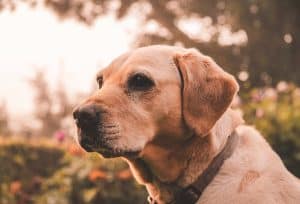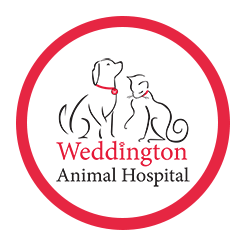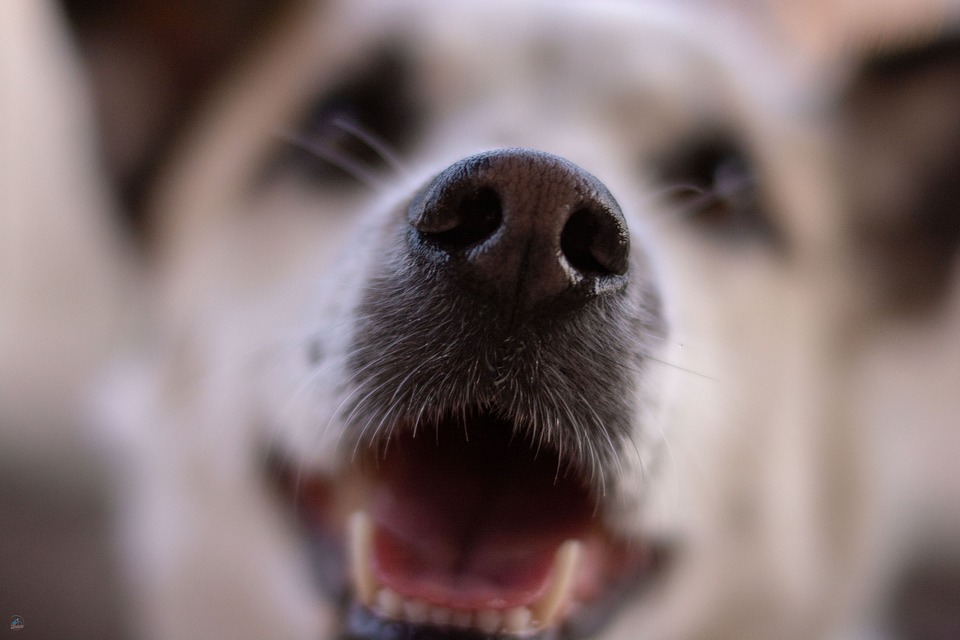There is a popular, old wives’ tale that describes that the status of a dog’s nose (wet, dry, hot or cold) can tell you a lot about its health. While your dog’s nose is one of the most complicated (and talented!) areas of their body, the state of your dog’s nose may not be able to tell you every secret into their health, as once believed. However, changes with their nose can sometimes indicate the potential for illness or concern. Occasionally, throughout the life of your pet (or even throughout the day), you may notice that their nose is dry. What does this mean and how does this factor into your pet’s health? Is there anything we should be worried about?
 A Typical Dog Nose
A Typical Dog Nose
A dog’s nose is a key component of their excellent ability to detect scents. A dog’s nose is incredibly more skilled than a human’s abilities. Your pet’s sniffer has 300 million olfactory receptors located within its borders. This number is approximately 40 times larger than a human’s nose. Your pets may be great at identifying scents – but why is their nose wet and cold all of the time?
Licking
Your pet’s nose is typically moistened by licking to help them smell and capture, even identify scents. The thin layer of mucus that covers their nose can help smells stick, like tiny particles, to be better identified. You may notice your dog licking their nose, to help “pick up” the smell. Your pet’s nose may be dry or wet at different times throughout the day.
Depending on the breed of your pet, a dry nose may be more common. Brachycephalic breeds (“short nose”), such as pugs, boxers, or bulldogs, are more prone to dry nose due to the conformation, or shape, of their face. When your pet is sleeping, their nose may be dry because they are not licking it.
Temperature & Age
Temperature, such as in the winter with the cold, or when the heater is on, can also dry out your dog’s nose, just like it can dry out our throat and lungs. As your pet gets older, their nose may become drier.
 What Can a Dog’s Nose Tell You?
What Can a Dog’s Nose Tell You?
Your pet’s nose can also give you insight into potential health problems.
- Allergies/ Respiratory Infection: If you notice your pet’s nose is excessively moist or runny, or having colored discharge, it may be an indication of allergies or a respiratory infection. If your pet is sneezing more than usual or is lethargic, not wanting to eat or drink, or coughing, we recommend consulting your veterinarian for advice or a consult.
- Dehydration: If you notice your pet’s nose is dry after a walk or a long time in the sun, it may be an indication that they are dehydrated. Offering them a cool place out of the sun and some water may help them recharge. It is important to ensure your pet has fresh water available at all times.
- Sun Burn: Some dog breeds may be prone to sunburn which can lead to a dry, flaky nose. If your pet has white fur or pink skin around their nose and lips, they may be more prone to developing sunburn. A dog-approved sunscreen may be used to help prevent exposure – just make sure your pet does not lick it off.
- Severe Allergies/ Autoimmune Disease: A thickened, crusting nose can be a sign of more aggressive disease, such as severe allergies, or even an autoimmune disease. If you notice your pet’s nose appears to look abnormal, crust, flake, or worsen over time, we recommend consulting your veterinarian for advice.
 Always Take Note of Major Changes
Always Take Note of Major Changes
Your dog’s nose can be helpful in identifying health issues. Whether your pet’s nose is wet or dry, it is important to consider their overall health. If you notice your pet has developed any changes in their lifestyle, such as decreased or increased appetite, lethargy, behavior changes, vomiting, diarrhea, increased drinking or urination, coughing, sneezing, or nasal or eye discharge, we recommend consulting your veterinarian. Any disease can present in a variety of ways, and your veterinarian can help you assess your pet’s overall health and identify any risks of disease.
At Weddington Animal Hospital, we care about every aspect of your pet’s health – from nose to tail. If you have noticed any changes with your pet, from their skin to their behavior, please feel free to contact us with any questions or to schedule an appointment with one of our doctors. Good observational skills, as well as a good relationship with your pet and your veterinarian, can help identify any issues with your pet. If you would like to learn more about our practice or schedule an appointment, contact us at 704-847-8466 or wah@wahcares.com.

